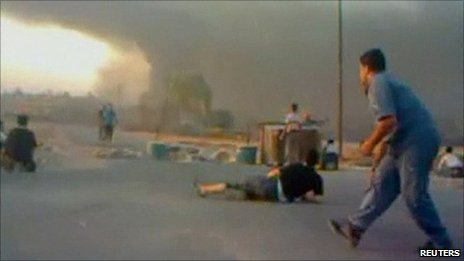
For followers of Islam, Ramadan is the holy month that marks the revelation of the first verses of the Koran to the Prophet Mohammad and is a time of fasting, contemplation, and charity. As the Arab Spring continues to progress through 2011, many wondered what effect Ramadan would have on the protests. On the one hand, additional evening prayers give people more opportunities to gather, but on the other hand long, hot days of fasting tend to sap energy and violence during Ramadan is generally looked down upon. However on the eve of Ramadan, the Syrian government decided that repeating its own bloody history would be a good way to mark the holy month.
According to local accounts, shortly before dawn Syrian army tanks broke through the barricades blocking off the central city of Hama. The city had been under siege for the last month following protests over the reign of President Bashar al-Assad. Once in the city, eyewitnesses reported indiscriminate shooting from heavy machine guns and shelling that resulted in the death of at least 100 people.
Although other cities also came under attack on Sunday, it is Hama that resonates most with people in the region. In 1982, security forces launched a scorched earth campaign against an uprising that challenged the rule of Assad’s father, Hafez al-Assad, killing 10,000 to 30,000 people. The Hama Massacre traumatized the region and shut down the hopes of any would-be activists for a generation. Since the start of the Arab Spring in December, analysts and activists have worried about “another Hama” that would have the same chilling results. Sunday’s assault demonstrated that a brutal crushing of the people is still possible in Syria, but the response of the population suggests that it may not work this time.
Instead, the memory of the Hama Massacre has become a rallying point for the country. Chants of “Hama! We will not let you down again!” have sounded in many Syrian cities even as the tactics of the government became more brutal. Last month, the city hosted US Ambassador Robert Ford in a visit heavily criticized by the Syrian government but popularly received by residents. And yesterday, in the face of what some are now calling the Ramadan Massacre, activist inside and outside of Syria pledged to continue fighting the regime no matter what.
One thing activists today have in their favor is modern media. Even while international journalists are largely banned from the country, news of the atrocities is still getting out thanks in large part to smuggled mobile and satellite phones that allow protesters to upload videos to YouTube and post updates on Facebook and Twitter. The appalling violence demonstrated in the videos uploaded yesterday is probably a major reason why condemnation from Western governments was so quick. President Obama condemned the attacks Sunday afternoon and the European Union moved to expand sanctions against Syria on Monday. Even Russia appeared to at least soften its stance against a UN Security Council resolution on Syria in the wake of the violence, though it remains unclear if it would drop its objection altogether.
Meanwhile, with Ramadan now in full swing the shelling of Hama by security forces continues for a second day and there are reports of violence in the town of Deir Al-Zor. Let the revolution continue…